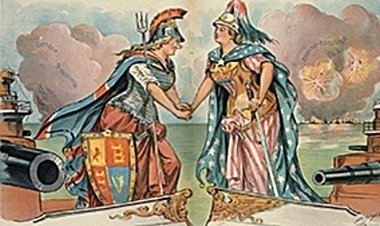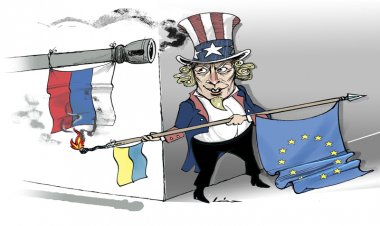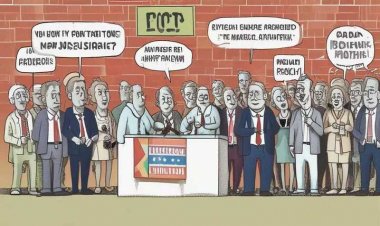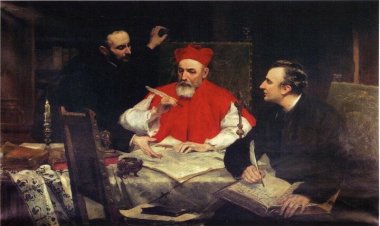Cancelling Human Knowledge
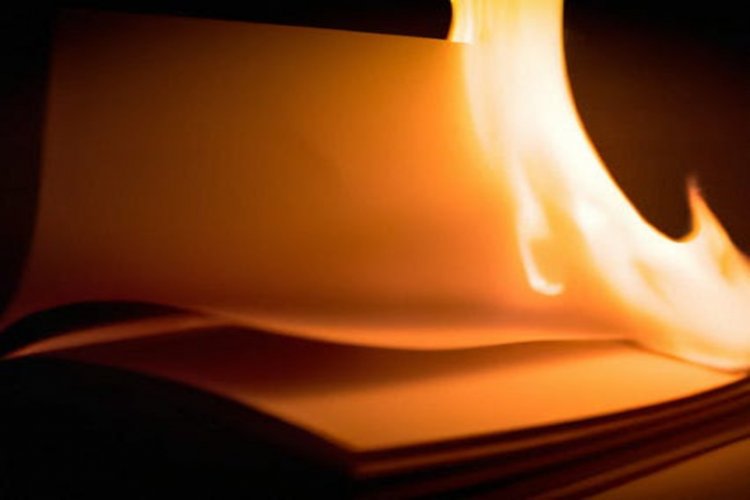
The Cultural Taliban Is Coming for Mathematics. Science, Philosophy, Classics etc….
One of the earliest and certainly the most prescient warning about the threat posed by the phenomenon that we now call Cancel Culture was published in 1949. George Orwell’s dystopic novel 1984 contains an important passage where its main character, Winston Smith, is told by a colleague in the Records Department of the Ministry of Truth: 'By 2050 – earlier probably – all real knowledge of Oldspeak [that is standard English] will have disappeared. The whole literature of the past will have been destroyed. Chaucer, Shakespeare, Milton, Byron – they’ll exist only in Newspeak versions, not merely changed into something different, but actually changed into something contradictory of what they used to be’.
Today, the reputation of the four great cultural figures cited by Orwell – Chaucer, Shakespeare, Milton and Byron – are being reframed as white supremacists by advocates of Cancel Culture.
Numerous so-called scholars represent Chaucer, the ‘father of English poetry’ as ‘a rapist, racist and antisemite’. That is why, two years ago, the University of Leicester announced that it would remove Chaucer from the English curriculum. Along with other problematic poets, he will be replaced with courses on ‘race, ethnicity, sexuality and diversity’.
If they can ditch Chaucer, is it any surprise that they are coming for Shakespeare? Some academics have concluded that his plays need to be de-colonised. They believe his play, A Midsummer Night’s Dream, displays ‘problematic, gendered and racialised dynamics’. Sections of the decolonisation crusade characterise Shakespeare’s texts as a resource for promoting white supremacy.
John Milton – one the earliest and bravest advocate of free speech – has been rediscovered as an apologist for slavery.¹ And despite his reputation for being an opponent of slavery, the poet Lord Byron is challenged because he ‘insistently privileges the purity and beauty of white bodies’.²
How soon before the powerful writings of Chaucer, Shakespeare, Milton and Byron will exist only in Newspeak versions depends on us and our willingness to understand and respond to the war being waged against the legacy of human knowledge and beauty.
The Assault on Knowledge
The assault on knowledge is waged on many fronts. There are numerous cultural institutions and non-governmental organisations that are committed to the goal of displacing the pursuit of knowledge in educational institutions with a political agenda.
In the United Kingdom, the Quality Assurance Agency (QAA) is at the forefront of imposing the doctrine of decolonisation on all intellectual disciplines. The decolonisation movement has many objectives, but in the Academy, its main objective is to discredit the intellectual foundation of Western cultural institutions.
The QAA has decided to embrace the tactic of the Chinese Cultural Revolution and subject British Universities to a regime of woke indoctrination. The latest target of the QAA is the discipline of mathematics. It demands that the math curriculum be decolonised and insists that the subject be taught as a vehicle for promoting the ideology of diversity.
The principal aim of politicising the mathematics curriculum is to ensure that students feel a sense of guilt and profound shame about the historical legacy of their subject.
There is something genuinely grotesque about how the QAA has gone about inventing scraps of evidence about the supposed complicity of maths with heinous crimes. The QAA guidance instructs university teachers to be aware that ‘some early ideas in statistics were motivated by their proposers’ support for eugenics. It claims that some astronomical data were collected on plantations by enslaved people. It also suggests that professors should know that in the past, some mathematicians possessed racist or fascist views or had connections to groups such as the Nazis.
The QAA’s attempt to recast the history of mathematics as steeped in racism is no doubt inspired by the North American decolonisation movement, where this subject is frequently denounced as very white and very oppressive.
Thankfully the QAA does not quite go as far as Canada’s Simon Fraser University, which hosted a seminar last October on ‘Racist Math’. The organisers of this conference promised that the event would unpack ‘oppressive structures and bias in math and science’!
Led by the QAA, the indoctrination of students is fast becoming the norm in British institutions. Even the most unlikely subjects – such as geology, archaeology and the classics – are under pressure to decolonise and apologise for their existence. Subjects such as economics, engineering, business and management, biosciences, languages, law and politics, and international relations have all been instructed to tow the QAA’s party line.
In true Taliban fashion, the QAA and sections of the Higher Education Establishment want to undermine British society's cultural and intellectual legacy. Decolonisation is another word for detaching British society from its intellectual and cultural heritage.
A leaked copy of the ‘draft inclusive curriculum development’ to ‘decolonise’ the engineering curriculum at Sheffield University warned that Isaac Newton may have benefitted from ‘colonial era activity’. It is evident that higher education is in big trouble when the engineering faculty promises to decolonise its curriculum to tackle ‘long-standing conscious and unconscious biases’ among students and challenge ‘Eurocentric’ and ‘white saviour’ approaches to science and maths, and promote ‘inclusive design’.
In effect, the plan to decolonise the engineering curriculum aims to morally de-authorise the reputation of one of the most important founders of modern science. The English mathematician, physicist, astronomer and author Isaac Newton is not just simply another scientist. He was and remains widely recognised as one of the greatest mathematicians and scientist of all time. Arguably, he was the most important figure in the scientific revolution.
Like mathematics and engineering, science has become the target of the decolonisation crusade. According to one of its advocates, science served as the British Empire's ‘practical’ and ‘ideological’ tool. Apparently, ‘since its birth around the same time as Europeans began conquering other parts of the world, modern Western science was inextricably entangled with colonialism, especially British imperialism. And the legacy of that colonialism still pervades science today’.
If they come for Newton, it is only a matter of time before individuals like Louis Pasteur, Michael Faraday or Einstein become the target of the know-nothing philistine diversity-inspired cultural revolution. So, it is unsurprising that Sheffield’s draft curriculum indicates that world-renowned scientists like Paul Dirac, Pierre-Simon Laplace and Leibniz could also ‘be considered as benefiting from colonial era activity’.
The decolonisation project of British universities has no interest in academic learning. Its objective is to discredit and take down the leading historical figures in the sciences and humanities. When I say take down, I mean literally take down. In an attempt to emulate the Rhodes Must Fall campaign targeting the statue of Cecil Rhodes in Oxford, students at Cape Town University adopted the phrase ‘science must fall’! It appears that discrediting science is a small price to pay for decolonising some of the most precious achievements of humanity.
Promoters of cancel culture are also coming for the classics. They attack the classics for being too white. In turn, academic institutions have accommodated these criticisms and are more than ready to turn the humanities into a propaganda weapon promoting woke ideals.
Two years ago, it was announced that Cambridge archaeology museum would display signs highlighting the ‘whiteness’ of ancient Greek sculpture plaster casts. Cambridge’s Classics Faculty decided to highlight ‘the role of classical sculpture in the history of racism’. Instead of extolling the unique aesthetic sensibility gained through studying the classics, this institution has opted to recast Greek and Roman civilisation as the cradle of modern racism.
Recently, the animosity against classical music has acquired a thoroughly racialised dimension. In line with the current Black Lives Matter-influenced zeitgeist, the classical music establishment has rolled over and embraced the criticism claiming that its institution is irredeemably compromised by association with white supremacy. That is why the Sydney Opera House organised a conference on ‘How to be Anti-Racist in the Arts. In the Anglo-American world, it has become obligatory for the classical music establishment to apologise for their art’s association with white privilege. At times the classical music press appears to portray a love of this art form as a marker of white supremacy. Writing in the New Yorker, the critic Alex Ross apologised cravenly for being a ‘white American’. He described his world as ‘blindingly white, both in its history and its present’. As far as Ross is concerned classical music is compromised by its supposed ‘history of systemic racism’.
In literature, the targeting and cancelling of the classics have assumed a ubiquitous form. There is now a concerted attempt to render some of the most important contributions to the literary canon invisible. Even Homer, whose Iliad and Odyssey are not just the foundational works of Greek literature but also Western civilisation, is dismissed with contempt by cultural jihadists.
‘Very proud to say we got the Odyssey removed from the curriculum this year!’ boasted one Massachusetts high school teacher recently on social media. When an English teacher boasts that Homer’s Odyssey has been cancelled and expects her followers to give her signs of approval, it becomes evident that even the classroom has become the battleground on which the culture war is being fought.
The campaign designed to discredit and de-authorise the humanities should concern us all, for what is at stake is the status of a cultural legacy that has endured for thousands of years and inspired people throughout the ages. If we lose sight of the artistic, literary and intellectual contribution of Ancient Greece and Rome, of the Renaissance and the Enlightenment, we risk falling under the spell of cultural illiteracy. We owe a great debt to the humanities, for they provided the foundation for developing human civilisation's moral and scientific insights.
The assault on knowledge threatens to corrode and discredit the intellectual foundation of our civilisation. Orwell’s prediction that by 2050 Newspeak will triumph no longer seems farfetched. Every time an academic subject or a field of intellectual or artistic endeavour becomes decolonised, we risk losing sight of what we have lost. As I noted elsewhere, society is coming under the spell of historical amnesia. That is why we must raise the alarm and take action to protect our arts and sciences from the cultural vandals stalking our institutions.
1*Jablonski, S., 1997. Ham's vicious race: Slavery and John Milton. Studies in English Literature, 1500-1900, 37(1), pp.173-190.
2*Canuel, M., 2015. Race, Writing, and Don Juan. Studies in Romanticism, 54(3), pp.303-328.
Frank Füredi


